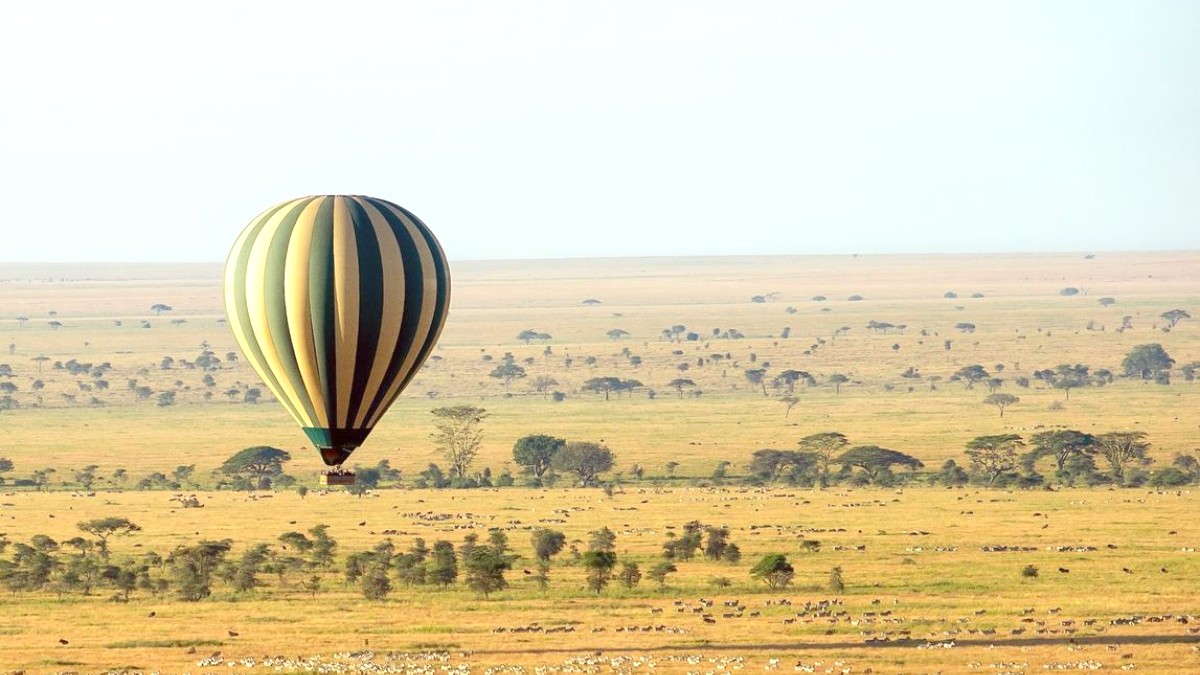
Northern Tanzania, Tanzania
The Dry Season runs from June to October. Temperatures range from 20-25°C (68-77°F) during the day. Nighttime lows drop to 10-15°C (50-59°F). Rainfall is minimal. The landscape dries, and vegetation thins. This makes wildlife easy to spot. Animals gather around permanent water sources. Concentration of animals often leads to frequent wildlife encounters. Roads can become dusty.
The Wet Season lasts from November to May. Temperatures average 25-30°C (77-86°F) during the day. Humidity levels rise. Nighttime lows stay warmer, around 15-20°C (59-68°F). Rainfall comes in short, intense bursts or afternoon thunderstorms. The landscape transforms into a lush, green paradise.
Your preferred activities influence the best time for your visit. Plan your Serengeti trip with these seasonal variations in mind.
The Dry Season features clear, crisp light, dusty sunsets, and animals against a golden backdrop.
July to October, January to February
Optimal wildlife viewing. Mara River crossings (August-September). Calving season (January-February).
Higher prices. More crowded areas. Book well in advance.
March, June, November, December
Fewer tourists. Lower prices. Beautiful green landscape. Superb birdwatching (Nov-Dec).
Some rain expected. Seasonal camps may close. Roads might be muddy.
April to May
Greenest season, dramatic skies. Lowest prices. Fewest tourists. Birdwatching thrives.
Heavy rains can limit road access. Some camps close. Wildlife disperses more widely.
During the Rainy Season, especially April and May, roads within the park can become muddy. Your guide knows the best routes. Rain can sometimes limit access to certain areas for a few hours. The rain, however, brings life to the plains and cleans the dust. In the Dry Season, dust frequents game drives. Vehicles create dust on well-used tracks. Prepare for dust.
For Great Migration River Crossings, plan your trip for late July to early October. August and September often feature dramatic crossings of the Mara River. This spectacle offers raw nature. For the Great Migration Calving Season, aim for late January to February. The southern Serengeti, specifically the Ndutu plains, becomes a nursery for hundreds of thousands of newborn wildebeest. This brings many predators. For General Wildlife Viewing, the dry season (June-October) often proves easiest. Birdwatching flourishes during the wet season, November to April.
Pack Sunglasses, a Scarf, or a bandana to protect your eyes and face. Camera equipment needs protection.
Dry season provides clear light and golden backdrops. Carry a lens cloth and dust blower.
Booking well in advance becomes critical for high season travel.
Wet season offers lush landscapes and dramatic skies, good for photography.
Robust 4x4 vehicles handle varied road conditions effectively.
Prepare your documents well in advance of your trip.
Most foreign nationals require a tourist visa for Tanzania. This includes citizens from the United States, United Kingdom, Canada, Australia, and European Union countries. Tourist visas remain valid for up to 90 days for a single entry. Multiple-entry visas are also an option.
Gather all necessary documents before travel. Strict enforcement applies to passport validity and blank pages.
Safari costs differ significantly based on your travel style and comfort level. These figures typically form part of your overall safari package.
Your health and safety in Serengeti take precedence. Prepare adequately to enjoy your trip without worry.
Certificate for arrivals from/transit through risk countries. Carry original.
Consult a travel health clinic 6-8 weeks before your trip.
Discuss prophylaxis with your doctor. Use insect repellent, wear long sleeves/pants, sleep under nets.
Prevention is for a Healthy Safari
Traveler's Diarrhea: Drink only bottled or purified water. Avoid ice if the source is uncertain. Eat well-cooked food. Practice strict hand hygiene. Use Hand sanitizer.
Sunburn/Heatstroke: Use high-SPF Broad-spectrum sunscreen. Reapply often. Wear a Wide-brimmed hat, sunglasses, and light, long-sleeved clothing. Stay hydrated with Bottled water. Animal-related injuries: Always follow your guide's instructions. Maintain safe distances. Do not approach or feed animals.
Access to Healthcare: Facilities within Serengeti are limited. Major emergencies require evacuation to Arusha or Nairobi. Your safari operator holds emergency protocols.
Always drink bottled water. Avoid tap water. Food at reputable lodges meets good hygiene standards. Use caution with raw foods outside trusted places. A Water purification bottle with a filter helps.
Within Serengeti, crime rates are very low. Wildlife poses the main "risk," managed by guides. In Arusha/Moshi, petty crime occurs in crowded areas. Exercise caution. Avoid walking alone at night. Use trusted taxis.
Flooding during heavy rains (April-May) can make roads impassable. Bushfires can occur in dry seasons. Wildlife is unpredictable; follow guide instructions and stay in vehicles.
Comprehensive travel insurance protects you financially. Ensure your policy covers specific needs.
For flight delays or cancellations, explore your compensation options.
Assists passengers in receiving compensation for delayed or canceled flights. Visit AirHelp for details on claims.
You could receive up to €600 in compensation. Rules apply based on flight distance and delay duration.
AirHelp handles the claim process, from documentation to communication with airlines. A fee applies upon successful compensation.